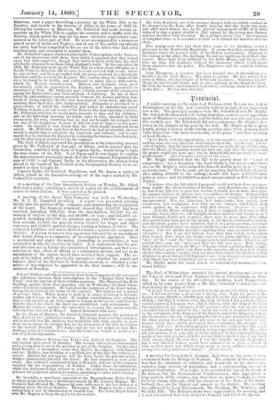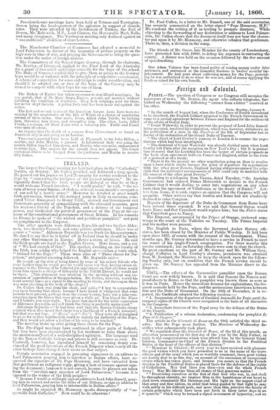Vnutiutial.
A public meeting on the subject of Parliamentary Reform was held at Birmingham on the 6th, and cursorily noticed in part of our impression last week. The principal speakers were Mr. Schokfield and Mr. Bright. Mr. Seholefield advocated a 51. rating franchise, a more equal apportion- ment of Members to population, and the ballot, not as a sine quil non, but if it could be got. Mr. Scholefield did not countenance Mr. Bright's doc- trines on the plunder of the poor by the rich. Mr. Bright spoke at :great length, giving a history of the reform question since 1832, praising Lord John Russell as "the most trustworthy of his party" and thus speaking of Lord Derby-
" Lord Derby took the opportunity, so it was reported, en one occasion of snaking some not very pleasant observations upon me, and he said, if I re- collect rightly, that the Queen would not have me in the House of Commons, that the House of Commons would not have me, and that the country and the _people would not have me ; but he himself fell into precisely the same predicament." (Loud 1«teghter and great cheering.) Mr. Bright admitted that the bill to be passed must be "a sort of compromise," not a deception like Lord Derby's, but not so comorehen- sive as Mr. Bright's, who claimed for himself and his party to be a "very moderate man." This he made out by asserting that Lord John Russell, after adding 500,000 to the suffrage, would still leave 4,500,000 men without votes ; and 22,400,000 as much unrepresented as if they lived in Naples. "I believe that the bill which I proposed would not have done any more than double the whole number of electors. And therefore my calculation is, that if my bill was to pass this session, it would not do more than raise the present million of electors into two millions of electors. If Lord John Russell's would leave 22,500,000 of people, mine would leave 20,009,000 unrepresented. You see, therefore, how immoderate, how unjust, how slanderous, how malignant, how false are the charges which have been made against sue in connexion with that matter. (Liiniense eLethig.) to the House of Lords, too, I have a suspicion that even in that assembly, where what we call daylight on these matters only breaks in as it were through chinks and crannies, there may be many men who—after this question has been put in the mouth of the Queen session after session, and after both parties have admitted that it is a great question, and must be settled—I think there are men in the House who will counsel a moderate course. I do not pledge myself to anythiug they may do until it is done. (Laughter.) But I am not without hope that they will do as they have done in past times when the thing comes to the point, and they must say ' Aye ' or No '—and 'No' does not appear to be maintainable—I say it is just possible they may say Aye,' and that the bill may pass. Now, really, only look at these men in the House of Lords—what a position they occupy ! With all their great pride and their noble ancestry, when they look abroad allover this country, can they shut out from their minds this great fact. that whatever is great and good in England comes from whatsoever personal and civil liberty has been established and is enjoyed by us ? "
Mr. Bright made his usual attack on taxation and measures f..r na- tional defence.
The Earl of Malmesbury attended the annual meeting and dinner of the Vales of Avon and Stour Farmers' Club, at Christchurch, on Mon- day. In the course of the after-dinner speaking, Lord Malmesbury, called up by some praises from a Mr. Tice, ventured to defend his con- duct during the spring of 18.59.
"I do not boast of having succeeded in the great task which was before me. I did not prevent a great and a bloody war. I did not prevent the deaths of some 80,000 or 100,000 men who fell on the fair and fertile plains of Italy ; but this I believe, with the help of God, I did prevent—I pre- vented a general European war ; this I believe, with the help of Gad and the assistance of my colleagues, I did prevent—that the war should have extended beyond the sphere it did ; and if my word is doubted it is proved by the statements of the Emperor of the French and of the Emperor of Aus- tria themselves—the one complaining that he was not assisted by England, the other saying that Prussia did not come to his aid, and both eir:um- stances being those which prevented their continuing the struggle any longer. (Cheers.) It has been properly stated this evening that this is not a political meeting, but I should not be acting respectfully to Mr. Tire, who has just spoken, or to you, who prpbably listened to him and heard his re- marks of me with pleasure, if I did not say that to the last day of my life I shall always thank Heaven that I was the humble means of prevent- ing a war which I believe would have extended to as great a length of time as that great war which swept away so many millions of nr2ii and swamped so many millions of money." (Loud cheers.).
A meeting has been held at Durham, Earl Grey in the chair, to hear a statement from the Bishop of Durham. The purport of this statement was that the extension of collieries and ironworks in the diocese has caused a large increase of population, and a corresponding anneint of spiritual destitution. This ought to be provided for out of the funds of the diocese, but the Ecclesiastical Commissioners, who appropriate a large portion of the revenue, say they have no power to make rei':11,C8 for local claims, although, with the exception of the Duke of No: thum- berland, they are the largest coal owners in the district. The meeting was addressed by Lord Ravensworth, Mr. Ileadlam, Mr, Mowbray, and Sir John Fife. The Bishop's views were supported by the meeting, and it was determined that they should be formally laid before the Queen.
Pro-church-rate meetings have been held at Totness and Torrington ; Devon being the head-quarters of the agitation in support of church- rates. They were attended by the Archdeacon of Totness, the Earl of Devon, Mr. Kekewick, M.P., Lord Clinton, the Honourable Mark Rolle, and many clergymen. The Torrington meeting only declared against an "unconditional" abolition of church-rates.
The Manchester Chamber of Commerce has adopted a memorial to Lord Palmerston in favour of the immunity of private property on the high seas in time of war, and praying the Government to bring the ques- tion under the notice of foreign nations.
The Committee° of the School frigate Conway, through its chairman, Mr. Beazley, of Liverpool, applied to the First Lord of the Admiralty for a grant of two naval cadetships annually for the boys of the school. The Duke of Somerset replied that to give them as prizes to the Conway boys would be at variance with the principle of competitive examination. A scheme of competition for some cadetships is under consideration, and should it be adopted one or two of the boys of the Conway may be named to compete with other boys for one of them.
The Bishop of Exeter has taken measures to stop illegal marriages. In one parish, that of St. Mary Steps, Exeter, persons got married without fulfilling the condition of residence. They took lodgings, paid for them, but never slept therein. A pima facie case has been made out against the rector.
The first and second mates of the American barque Anna have been re- manded by the magistrates of the Isle of Wight on a charge of murdering several of their crews. One mate, Hires, killed John Turtle, by kicking him, throwing him clown, and strangling him. The other, Lane, killed Frank, a seaman, off Start Point with a belaying'pin. Turtle and Frank were men of colour.
An inquiry into the death of a seaman from ill-treatment on board an American ship is also going on in London.
Two courts-martial have been held at Plymouth to try John Dillon, a marine, and John Martin, a gunner. As Lieutenant Daly was going the rounds Dillon knocked him down, and Martin, who was near, endeavoured to strike him. The motive for the assault does not appear. The Court sentenced Dillon to be hanged from the yard-arm, and Martin to receive fifty lashes.



























 Previous page
Previous page